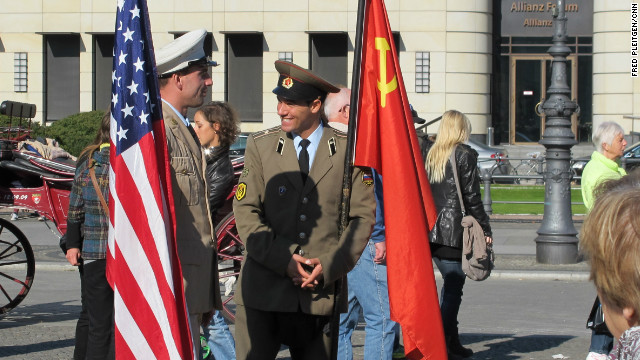October 19, 2012 -- Updated 1326 GMT (2126 HKT)
STORY HIGHLIGHTS
- Few cities' recent history has been more influenced by the U.S. than Berlin
- While Berliners have a lot to thank U.S. for, that doesn't mean they like U.S. policies
- American policies will not divert Berlin from charting course of Europe
Editor's note: Frederik Pleitgen has been the Berlin correspondent for CNN since 2006.
(CNN) -- You'll have a hard time finding another
city in Europe whose recent history has been more influenced by the
United States than Berlin.
In the German capital
near the Brandenburg Gate -- right where the Wall used to divide this
town into communist Eastern and capitalist Western sides -- the U.S.
Embassy recently set up a plaque commemorating Ronald Reagan's 1987
speech where the 40th president called on then Soviet leader Mikhael
Gorbachev to, "tear down this wall."
Just a ten minute drive
away you reach the former Checkpoint Charlie, the scene of a major
standoff between American and Russian tanks in 1961 that brought the
world close to nuclear war.
And just another ten
minutes away you find the city hall of the district of Schöneberg, where
John F. Kennedy held his famous speech in 1963, pledging allegiance
with this city on the front line of the Cold War and finishing with the
famous words, "Ich bin ein Berliner."
My own history is
reflected in this special relationship Berlin has with the U.S. as well.
In the late 1970's and early 1980's my father worked as the East Berlin
correspondent for West German TV. I went through the Berlin Wall every
morning from East to West to get to kindergarten. In 1982 we moved to
Washington D.C, where America embraced us immediately and we embraced
American culture. Today, my family and I live in Berlin.
Germans have a lot to
thank America for. Berliners have a lot to thank America for. They know
that. It does not mean they have to like all American policies or the
current state of American politics.
Clemens Wergin, foreign
editor of Die Welt newspaper, says most Germans are well informed about
the state of the election campaigns.
"Given that America is
still the superpower, people tend to inform themselves quite regularly
about the states and U.S. politics," Wergin told CNN, noting that a vast
majority of Germans would vote for the incumbent president if given the
option.
"This is because
Democrats usually are seen to be more in tune with some core European
beliefs regarding welfare, the use of military force, the role of
religion in society or social issues such as abortion or gun rights."
Furthermore, many
Germany equate Mitt Romney with the policies of the Bush administration
-- and positions he staked out during the primary season have toughened
many Germans' views of the Republican nominee. Many believe Romney will
further cut social programs in the U.S. and repeal Obamacare -- not the
most popular stance in a country like Germany, which has a very large
public health care system.
In 2008, then-Senator
Obama used Berlin as a stage for a major foreign policy speech. More
than 200,000 Berliners and expats showed up to watch the man promising
change after eight years of George W. Bush alienated many Germans -- and
led them to fundamentally question whether the U.S. and Europe were
finally drifting apart for good.
Now, four years later,
the mood is more subdued and the Obama hype has cooled down. "He has
lost some of his appeal and people realized that he couldn't deliver the
change he promised," says Wergin, an assessment many Berliners would
agree with.
Interest in American
politics and the upcoming election is waning not only due to a perceived
decline of American power, but also because Germany and Europe are
grappling with a financial crisis that has propelled Germany into the
leadership role the country has tried to avoid since the end of World
War II.
Therefore, it is no
surprise that the race for the White House only rarely makes it to the
top of the news agenda in Germany. It was may have been front page news
after the presidential and vice presidential debates, but the campaign
remains buried deep in the "international news" sections on most other
days.
The U.S. has been all
but absent as the European Union deals with the biggest economic and
identity crisis in its history. Meanwhile, Germany is awkwardly finding
itself in the role that the U.S. used to fulfill for many Europeans: the
major power, hated for seemingly bullying smaller countries to follow
its lead, but also admired because it is the only one with the stability
and financial firepower to come to terms with the crisis.
Strangely, a tour around
Berlin illustrates this new balance of power as well. The plaques,
monuments, and historical sites that illustrate America's sacrifices for
this country and this city are still here, but they're from an era that
has passed. A new Berlin has risen and forged for itself a new and very
unique identity as a major political and cultural center in the heart
of Europe.
Germany and its capital
city have grown up and evolved. They will take note of American
politics, but ultimately American politics will not steer them away from
the course they are charting for themselves and for Europe.



 Few European cities have been more
recently affected by the U.S. than Berlin, where America's role in
propping up West Berlin during the Cold War against Soviet Communism
remains in the public conscience.
Few European cities have been more
recently affected by the U.S. than Berlin, where America's role in
propping up West Berlin during the Cold War against Soviet Communism
remains in the public conscience.













0 comments:
Post a Comment